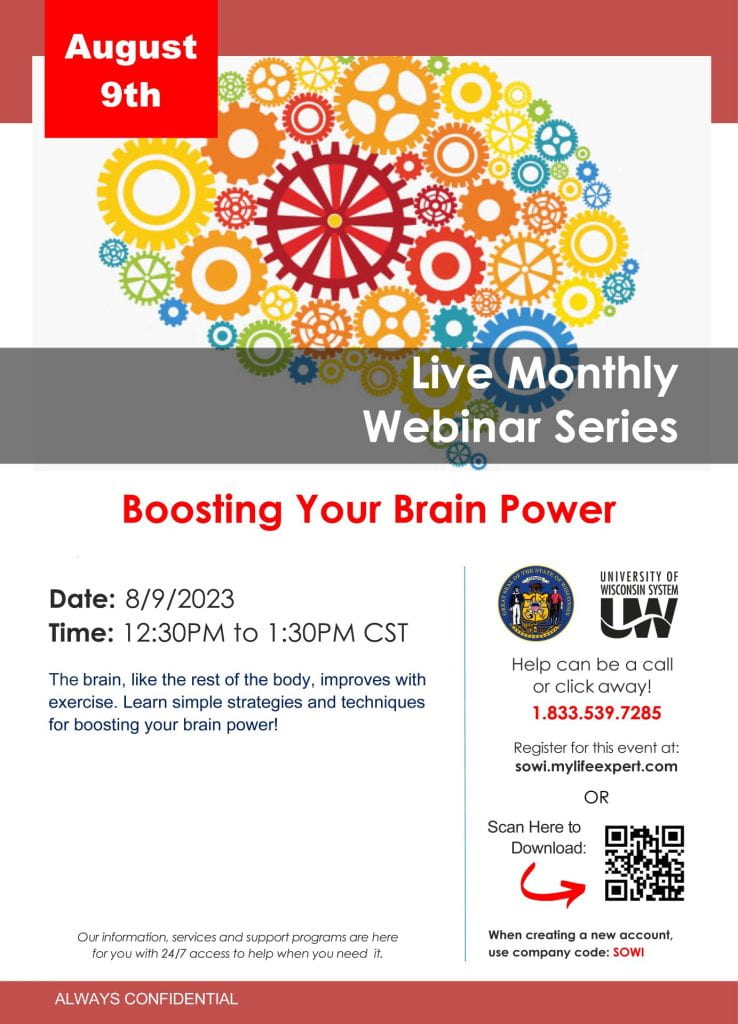Author: deeringk
Know Your Benefits: College Students & Health Insurance Benefits
If you have a child in college that you cover as a dependent on your State Group Health Insurance plan, here are some tips about their coverage.
-
- If they attend school within your health plan’s service area, they should seek care only from in-network providers unless they need Emergency Room or Urgent Care services.
- If they attend school outside your health plan’s service area, Urgent Care and Emergency Room services will be covered by your health plan as in-network.
After an Urgent Care or Emergency Room visit, in most cases, your child must return to your health plan’s service area for follow-up care.
Since most plans only provide coverage for services when they are in-network, it is important that you plan for the possibility of your child needing care.
For additional information, including mental health services, review the College Students and Health Benefits article.
Source: UW System HR
August EAP Webinar – Boosting Your Brain Power
New Student Employment Forms
In a continued effort to streamline processes, the Office of Human Resources and Workforce Diversity is excited to announce the following student employment forms are now live within BP Logix:
Through BP Logix, these standard student employment forms can be completed and approved completely electronically. E-mail notifications will be sent directly to the student employees throughout the process, providing them with pertinent new hire information and resources (i.e., direct deposit, W-4 forms, timesheet instructions).
In addition, as previously noted within the Mission Alignment and Economic Resilience exercise for Human Resources, the processing of I-9 forms will be centralized. As part of the new BP Logix student employment forms process, the Office of Human Resources will now complete the Criminal Background Check and I-9 steps from start to finish for all student hires. This includes the employer verification step in reviewing documents of the I-9.
Announced last week, a Student Supervisor Training Series is being offered to aid student supervisors in the full life-cycle of student employment. The first training session, being held on July 31st, will include information and a demonstration on the new student employment forms.
If you have questions, please feel free to contact Human Resources at (920) 465-2390 or hr@uwgb.edu.
Adjustment to Night & Weekend Differential
Effective July 2, 2023, night and weekend differentials for hourly non-exempt University Staff have increased.
-
- Night differential (for hours worked between 6:00 p.m. and 6:00 a.m.) have increase from $0.45 to $0.80 per hour.
- Weekend differential (for hours worked between 12:00 a.m. on Saturday and 12:00 midnight on Sunday) have increased from $0.60 to $0.80 per hour.
There are no changes in time reporting for employees, the system has been configured with the differential updates.
For more information, see UW System Administrative Policy 1277.
June EAP Webinar – Navigate Life’s Transitions
Benefits Administration Transition
In a continued effort to better support UW-Green Bay faculty and staff, align with the institution’s mission and strategic initiatives, and streamline processes, the Office of Human Resources and Workforce Diversity will be transitioning benefits administration functions to UW System on April 10, 2023. UW System has been leading this move to a centralized, shared-services benefits support model over the past couple of years. It follows the centralization of payroll support, which UW-Green Bay transitioned in November, 2021.
UW-Green Bay will join a number of other UW institutions who are already utilizing the UW System Benefits Counseling Team, including UW-Oshkosh, UW-Parkside, UW-Whitewater, UW-Platteville, UW-Stevens Point, and UW-Superior. The UW System Benefits Counseling team is comprised of benefits specialists who have deep and broad subject matter expertise on the benefits offered by the UW System.
This benefits support change aligns with recent efforts undertaken by the UW-Green Bay Office of Human Resources and Workforce Diversity to transition away from primarily transactional activities, and towards becoming a true strategic partner with employees, managers and leadership at UW-Green Bay. Centralization of payroll/benefits and the upcoming implementation of Workday will allow our office to become more future-focused, holistically supporting employees and managers throughout the career lifecycle and contributing more fully in the areas of business analytics, employee engagement, and organizational strategy.
What does the change in benefits support mean for employees?
- General Questions and Support: Employees needing benefit-related information or counseling will work directly with a team of benefit counselors at UW System. Employees will experience little to no change in service as this team is trained in the full array of benefit options offered to UW System employees and can offer individualized support while considering each employee’s unique situation.
- Retirement Counseling: Employees considering retirement, or those who are ready to finalize the details of their retirement, will be able to meet virtually with the benefit counselors to receive guidance through the retirement process.
- Benefit Orientations: Newly hired employees, or those transitioning into benefits-eligible positions, will be contacted directly by the benefit counseling team and offered information on enrollment deadlines and benefit packages available. They will be encouraged to attend a virtual bi-weekly benefits orientation session. One-on-one appointments are also available.
- Open Enrollment: The benefits counseling team will lead open enrollment activity at our university with virtual informational sessions while still offering the ability to meet with employees to answer questions and review options.
How do employees get benefits support when they need it?
The Benefits Counseling Team uses a ticketing system to track and respond to all inquiries. Employees can contact the team by either sending an e-mail to benefits@uwss.wisconsin.edu or leaving a message at (888) 298-0141. This contact information will also be housed on our UW-Green Bay benefits website. Employees will begin utilizing this contact starting April 10, 2023.
What will be the role of the UW-Green Bay Office of Human Resources for benefits functions going forward?
- FMLA & ADA: The UW-Green Bay HR team will remain responsible for administration of all Family and Medical Leave Programs and accommodation requests. Employees can contact hr@uwgb.edu if they need assistance or have questions about FMLA and/or ADA.
- Employee Well-being: The UW-Green Bay HR team will continue to work with the Wellness Committee to lead all well-being related activities and programs for our employees.
- UW-Green Bay HR Systems & Rewards Team: The team will maintain responsibility for all activity within HRS and related systems, play a key role in the Workday transition, and serve as a liaison to UW System Payroll & Benefits teams. In addition, this team will provide additional strategic data analysis, forecasting for decision-making, and digital transformation of HR-related business processes.
While our office will move away from providing benefits services, we are excited about the opportunities this transition will provide to better serve as a strategic partner with the campus community. If you aren’t sure who to reach out to, or have any questions or concerns about this transition, please feel free to contact us at hr@uwgb.edu or (920) 465-2390.
March EAP Webinar – Workplace Differences: A Matter of Style
2023 America Saves Week
Income Continuation Insurance: Deferred Enrollment Period and Premium Update
An Income Continuation Insurance (ICI) Deferred Enrollment opportunity is currently available through March 1, 2023, for eligible employees.
Additionally, employees who are currently enrolled in ICI will have a premium update effective February 1, 2023.
ICI provides replacement income if you are unable to work due to a short or long-term disability.
Deferred Enrollment Period
Employees who are eligible for the ICI Deferred Enrollment Period were notified of their eligibility via email the week of January 30. To enroll, submit an application to your institution benefits contact by 4:30 p.m. on Wednesday, March 1, 2023.
Generally, you will be eligible for a deferred enrollment if:
- You are currently enrolled in ICI and have Standard ICI coverage, you may be eligible to enroll in Supplemental ICI coverage.
- You are not currently enrolled in ICI, but meet one of the deferred enrollment provisions. This is the only time during the year you may enroll in ICI without evidence of insurability.
Review your personalized ICI employee web page to determine your enrollment opportunity and for an estimate of your premium.
Premium Update
ICI premiums are reviewed annually with any updates effective February 1 each year. Premium changes for 2023 will be reflected on the February 23, 2023, paycheck. Visit your personalized ICI employee web page for your premium summary.
There are several factors that determine your premium amount:
- Annual Premium Update
- For Faculty/Academic Staff/Limited Appointees: ICI premium* is based on your 2022 eligible earnings and the elimination period you elected.
- For University Staff: ICI premium* is based on your 2022 eligible earnings and unused sick leave balance as of December 31, 2022.
- Premium Rate
- For 2023 the ICI premium rates will decrease slightly. While premium rates are decreasing, your eligible earnings and sick leave balance may cause your premium amount to increase.
More Information
For ICI plan information visit the UW System Employee Benefits ICI web page. After reviewing the web page, if you have questions, contact your institution benefits contact.
* If you were on an unpaid leave of absence during 2022, review your ICI employee web page for information on how your premium may be affected.
Source: UW System Human Resources





